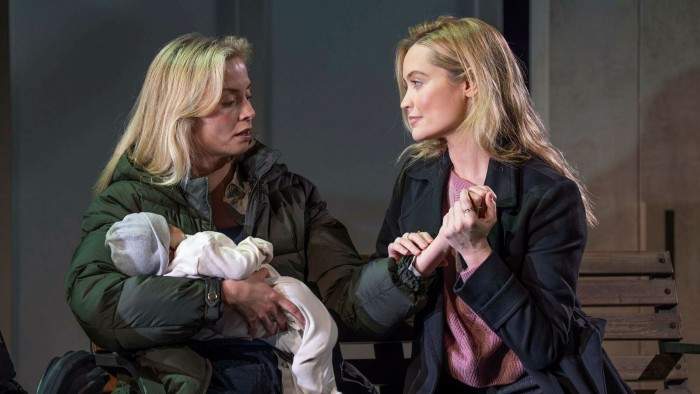Unlock the Editor’s Digest for free
Roula Khalaf, Editor of the FT, selects her favourite stories in this weekly newsletter.
Teacher recruitment can be difficult but even so, you’d hope that your child’s primary school might manage to avoid hiring a vampire. No such luck for Mia (Sophie Melville) in John Donnelly’s new play Apex Predator. She’s initially pleased to bond with her son Alfie’s temporary teacher, Ana — particularly as Ana (Laura Whitmore, chillingly elusive) sees extraordinary talent in Alfie’s frankly disturbing drawings (figures with knives for teeth, that kind of thing).
Sure, there are some odd moments — like Ana’s appreciative description of Alfie biting another child — “between us, it was a decent bite” — or her offer to breastfeed Mia’s five-month-old daughter. But it’s when the two go on a boozy night out that things get really weird.
Donnelly’s drama is initially fun and daring: a bold comedy thriller, combining the supernatural with the psychological. He weaves together the fears and torments of contemporary daily life — the noisy neighbours, aggressive strangers on the Tube, partner on night shifts, multiple churning anxieties of parenthood — with the centuries-old myth of the vampire as a manifestation of what terrifies us. He writes with pithy wit and accuracy about the bone-deep weariness and sleep-starved mindset that can accompany early parenthood and the nagging urge to protect.
Mia can’t sleep, kept awake by her tiny daughter and the neighbour’s music, is isolated, exhausted, depleted and emotionally fragile. Her doctor suggests breathing techniques and white noise. Ana suggests a rather different solution. Mia spirals and we are never quite sure, in Blanche McIntyre’s production, what is in her head and what is real (Melville is very good at suggesting wired exhaustion).
There are interesting thoughts here about the way physical change can be disorientating and about the way ancient ideas resurface: Mia’s partner Joe (Bryan Dick) is a modern-day vampire hunter, monitoring encrypted online chat forums. Questions, too, about our sense of impotence in the face of global events and how far any of us might go to gain an element of control. Meanwhile the style see-saws between Gothic horror and comedy.
But what begins as an unsettling exploration of the porous barrier between internal and external worlds (reflected in Tom Piper’s set of a kitchen surrounded by scaffolding) runs out of road. The play’s supernatural element starts to feel increasingly shaky and the metaphor stretches too thin. Meanwhile the psychological territory becomes too serious for the form: there’s a deeply disturbing twist at the end that doesn’t feel well supported. It’s a bold contemporary reworking of a myth that refuses to die. But in the end, like its protagonist, it bites off more than it can chew.
★★★☆☆
To April 26, hampsteadtheatre.com
Read the full article here

